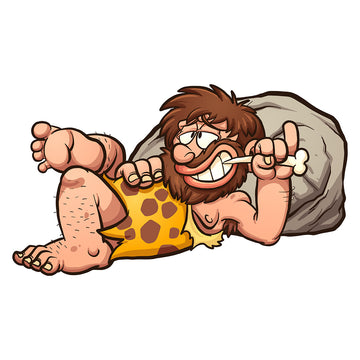
When Did People Start Brushing their Teeth? Or, if Cavemen Did Not Brush, Why Should I?

It would seem logical that with all the care we give to our teeth today, that our ancestors should not have any teeth left at all. Right?
So, it can seem perplexing that our ancient ancestors, talking cavemen here, rarely had any signs of tooth decay.
The answer to this caveman riddle is simple, their diets were far simpler than ours and contained far fewer carbohydrates–with grains and sugars almost non-existent. Primarily they “feasted’ on meats and higher-fiber foods. This type of primitive diet does not contain the carbs that encourage the bacterial growth underlying tooth decay and gum disease. Additionally, higher fiber foods actually assist in cleaning the mouth. Of course, there has always been the problem of food stuck in our teeth so it is likely that our forefathers used things like animal bones and feathers to clean gunk from their teeth.
Moving from the hunter-gatherer mode to farming and agriculture created a huge shift in man’s diet. By bringing in grains, carbohydrates and sugars this transformed the oral bacteria composition, encouraging the growth of acid-producing bacteria. Anthropologists can see a huge difference between the teeth of hunter-gatherers and those that now lived in an agricultural society. As we transitioned to cities and farms, tooth decay and gum disease became a problem.
Thankfully the development of agriculture also allowed for the development of civilization and knowledge. Personal oral hygiene goes back centuries.
People soon figured out that they needed to take care of their teeth. The earliest evidence of a “toothbrush” goes back to before 3000 BC in the area around Egypt. It was here that people started using devices crafted from wooden twigs to clean their teeth. They also developed various types of tooth powder from ashes, chalk, shells and ground bones. The Romans and Greeks seemed to like a powder mix that was based on the ashes of ox hooves, oyster shells and eggshells.
In Asia, around 1600 BC, there is evidence that the Chinese were using specific types of wood (apparently those with natural oils) to clean their teeth and freshen their breath. And, many centuries ago, the wealthy also began using a type of brush made from wood and hog bristle hairs, basically a rustic toothbrush.
Throughout these early civilized areas, tooth “chew sticks” were widely used. These are simply as they sound, small pieces of wood (twigs) that one chews upon to clean their teeth. To this date, one can still find chew sticks for sale in countries such as India, as well as rural areas around the world.
Much later, in Medieval Europe, teeth were cleaned with rough cloth. Often materials, such as ashes, chalk, salt or charcoal were added to the cloth for extra cleaning power.
Solving dental problems led to some odd remedies, such as kissing a donkey if one had a toothache or boiling dog teeth in wine to make mouthwash… yuck!
Bottomline, in one form or another, man has had to invent ways to control the bacteria in his mouth. As the intake of carbs and sugars accelerated over time, the need for ongoing dental hygiene became ever more important. Doing so is more important today than ever before in our evolution.
Daily brushing and flossing still remain a must. And although a chore, it certainly is much more fun than gargling with a “dog teeth and wine” mouthwash or burning ox hooves to make toothpaste!
Underlying all oral health problems is the issue of bacterial overgrowth. While daily dental hygiene will keep this under control, the real solution lies in attacking the problem. Dietary changes, such as reducing sugar and carbs while upping fiber foods and keeping hydrated, are a great place to start.
A newer approach in long-term dental care, is to restore a healthy bacterial balance through the introduction of beneficial bacteria. These are known as oral probiotics. The long-term use of effective oral probiotics (such as our patented blend of oral probiotics, from Great Oral Health) colonizes the mouth with beneficial bacteria that crowd out and inhibit the growth of the bad guys in your mouth. The result is fresher breath, fewer colds and sore throats, stronger teeth and healthier gums.
And as a healthy mouth also supports better health overall, it makes complete sense to keep your oral cavity as healthy and happy as can be.